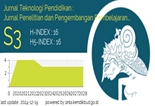Analysis of the Contribution of Historical Empathy to the Achievement Student Profile of Pancasila
Abstract
Full Text:
PDFReferences
Abdi, G. P. (2020). Peranan pembelajaran sejarah untuk pembentukan karakter siswa SD. Jurnal Pendidikan Tambusai, 4(1), 802–815.
Agung, D. A. G. (2017). Keragaman Keberagaman (Sebuah Kodrati Kehidupan Berbangsa dan Bernegara Berdasarkan Pancasila). Sejarah Dan Budaya : Jurnal Sejarah, Budaya, Dan Pengajarannya, 11(2), 151–159. https://doi.org/10.17977/um020v11i22017p151
Barton, K. C., & Levstik, L. S. (2004). Teaching history for the common good. Routledge.
Dahliyana, A., Rizal, A. S., & Nurdin, E. S. (2020). Analisis Implementasi Pendidikan Karakter Dalam Konteks Pendidikan Umum Menurut Kajian Teori Kritis Jurgen Hubermas. Jurnal Visi Ilmu Pendidikan, 12(2), 90–99. https://doi.org/10.26418/jvip.v12i2.39107
Downey, M. T. (1996). Writing to learn history in the intermediate grades. National Center for the Study of Writing and Literacy.
Dulberg, N. (2002). Engaging in history: Empathy and perspective taking in children’s historical thinking. Paper presented at the annual meeting of the American Educational Research Association.
Egan, G. (2010). The Skilled Helper: A Problem-Management and Opportunity-Development Approach to Helping. Cengage Learning.
Endacott, J., & Brooks, S. (2013). An Updated Theoretical and Practical Model for Promoting Historical Empathy. Social Studies Research and Practice, 8(1), 41–58. https://doi.org/10.1108/SSRP-01-2013-B0003
Feshbach, S. (1987). Individual aggression, national attachment, and the search for peace: Psychological perspectives. Aggressive Behavior, 13(5), 315–325. https://doi.org/10.1002/1098-2337(1987)13:5<315::AID-AB2480130508>3.0.CO;2-4
Foster, S. (2001). Historical empathy in theory and practice: Some final thoughts. Rowman and Littlefield Inc.
Gallagher, S. (2019). Dilthey and empathy. Interpreting Dilthey: Critical Essays, 145–158.
Guritno, T. (2021). Catatan KPAI: 17 Kasus Perundungan dan Kekerasan di Lingkungan Sekolah Terjadi Sepanjang 2021. Kompas.Com. https://nasional.kompas.com/read/2021/12/29/15430801/catatan-kpai-17-kasus-perundungan-dan-kekerasan-di-lingkungan-sekolah
Harrington, A. (2001). Dilthey, Empathy and Verstehen A Contemporary Reappraisal. European Journal of Social Theory, 4(3), 311–329. https://doi.org/10.1177/13684310122225145
Haryono, S. (2017). Metode SEM untuk penelitian manajemen dengan AMOS LISREL PLS. Luxima Metro Media, 450.
Howe, D. (2015). Empati: Makna dan Pentingnya. Pustaka Pelajar.
Irawati, D., Iqbal, A. M., Hasanah, A., & Arifin, B. S. (2022). Profil Pelajar Pancasila Sebagai Upaya Mewujudkan Karakter Bangsa. Edumaspul: Jurnal Pendidikan, 6(1), 1224–1238. https://doi.org/10.33487/edumaspul.v6i1.3622
Izzati, F. A. (2021). Pentingnya Sikap Toleransi dan Empati dalam Mewujudkan Warga Negara yang Baik (Good Citizenship) di Masa Pandemi. Jurnal Kalacakra: Ilmu Sosial Dan Pendidikan, 2(2), 85–90. https://doi.org/10.31002/kalacakra.v2i2.4368
Kasih, A. P. (2021). 41 Persen Murid Indonesia Alami “Bully”, Siswa SMA Buat Atasi Trauma. Kompas.Com. https://www.kompas.com/edu/read/2021/03/20/084259871/41-persen-murid-indonesia-alami-bully-siswa-sma-buat-aplikasi-atasi-trauma?page=all
Kusuma, R. A. (2019). Dampak Perkembangan Teknologi Informasi dan Komunikasi terhadap Perilaku Intoleransi dan Antisosial di Indonesia. MAWA’IZH: JURNAL DAKWAH DAN PENGEMBANGAN SOSIAL KEMANUSIAAN, 10(2), 273–290. https://doi.org/10.32923/maw.v10i2.932
Lee, P. J. (1984). Historical Imagination. AK Dickinson, PJ Lee ve PJ Rogers. Learning History, 90–116.
Mellenia, R., Kuntarto, E., & Noviyanti, S. (2022). Strategi Guru Dalam Membentuk Karakter Cinta Tanah Air Siswa Kelas V Sekolah Dasar. SCHOLASTICA JOURNAL : JURNAL PENDIDIKAN SEKOLAH DASAR DAN PENDIDIKAN DASAR (Kajian Teori Dan Hasil Penelitian), 5(1). https://doi.org/10.31851/sj.v5i1.6937
Nowak, M. (2011). The complicated history of einfuhlung. Argument: Biannual Philosophical Journal, 1(2), 301–326.
Perni, N. N. (2018). Penerapan Teori Belajar Humanistik dalam Pembelajaran. Adi Widya: Jurnal Pendidikan Dasar, 3(2), 105–113. https://doi.org/10.25078/aw.v3i2.889
Pertiwi, R. E. (2018). Pendekatan Eksistensial Humanistik berbasis nilai budaya gotong-royong untuk meningkatkan empati siswa Sekolah Menengah Atas. Prosiding Seminar Nasional Bimbingan Dan Konseling, 2(1), 55–63.
Pusat Penguatan Karakter. (2022). Profil Pelajar Pancasila. Cerdasberkarakter. https://cerdasberkarakter.kemdikbud.go.id/profil-pelajar-pancasila/
Rachmawati, N., Marini, A., Nafiah, M., & Nurasiah, I. (2022). Projek Penguatan Profil Pelajar Pancasila dalam Impelementasi Kurikulum Prototipe di Sekolah Penggerak Jenjang Sekolah Dasar. Jurnal Basicedu, 6(3), 3613–3625. https://doi.org/10.31004/basicedu.v6i3.2714
Rusnaini, R., Raharjo, R., Suryaningsih, A., & Noventari, W. (2021). Intensifikasi Profil Pelajar Pancasila dan Implikasinya Terhadap Ketahanan Pribadi Siswa. Jurnal Ketahanan Nasional, 27(2), 230–249. https://doi.org/10.22146/jkn.67613
Seixas, P. (1996). Conceptualizing the growth of historical understanding. In D. R. Olson & N. Torrance (Ed.), The handbook of education and human development. Blackwell.
Septiani, D., Martini, A., & Akbar, Z. (2020). Studi Literatur Pengembangan Empati Untuk Menghadapi Masyarakat Era 5.0. Prosiding Seminar Dan Diskusi Pendidikan Dasar.
Shemilt, D. (1984). Beauty and the philosopher: Empathy in history and classroom. Learning History, 39–84.
Sudarsana, I. K. (2018). Pengaruh Model Pembelajaran Kooperatif Terhadap Peningkatan Mutu Hasil Belajar Siswa. Jurnal Penjaminan Mutu, 4(1), 20–31. https://doi.org/10.25078/jpm.v4i1.395
Susanto, H., & Purwanta, H. (2022). Analisis Pola Narasi Reflektif Buku Teks Sejarah SMA Untuk Pencapaian Empati Sejarah. Yupa: Historical Studies Journal, 6(1), 45–62. https://doi.org/10.30872/yupa.v6i1.1066
Susilawati, E., Sarifudin, S., & Muslim, S. (2021). Internalisasi Nilai Pancasila Dalam Pembelajaran Melalui Penerapan Profil Pelajar Pancasila Berbantuan Platform Merdeka Mengajar. Jurnal Teknodik, 155–167. https://doi.org/10.32550/teknodik.v25i2.897
Ulifah, D., & Suwanda, I. M. (2020). Strategi Sekolah Dalam Menanamkan Sikap Cinta Tanah Air Pada Peserta Didik di SMPN 1 Tarik Kabupaten Sidoarjo. Kajian Moral Dan Kewarganegaraan, 8(3), 871–886.
Zuriatin, Z., Febriana, L., & Nurlaila, N. (2021). Peranan Pembelajaran Sejarah dalam Membentuk Karakter Cinta Tanah Air Siswa Era 4.0 di SMAN 1 Palibelo. Pendikdas: Jurnal Pendidikan Dasar, 2(2), 10–18.
DOI: https://doi.org/10.33394/jtp.v10i2.15079
Refbacks
- There are currently no refbacks.
Copyright (c) 2025 Heri Susanto, Sariyatun Sariyatun, Djono Djono, Fathurrahman Fathurrahman

This work is licensed under a Creative Commons Attribution-ShareAlike 4.0 International License.
This Journal has been Indexed by:
Jurnal Teknologi Pendidikan
ISSN: 2656-1417 (Online)
ISSN: 2503-0620 (Print)
Published by Program Studi Teknologi Pendidikan, FIPP
Universitas Pendidikan Mandalika
Email: [email protected]

This work is licensed under a Creative Commons Attribution-ShareAlike 4.0 International License.















.png)






